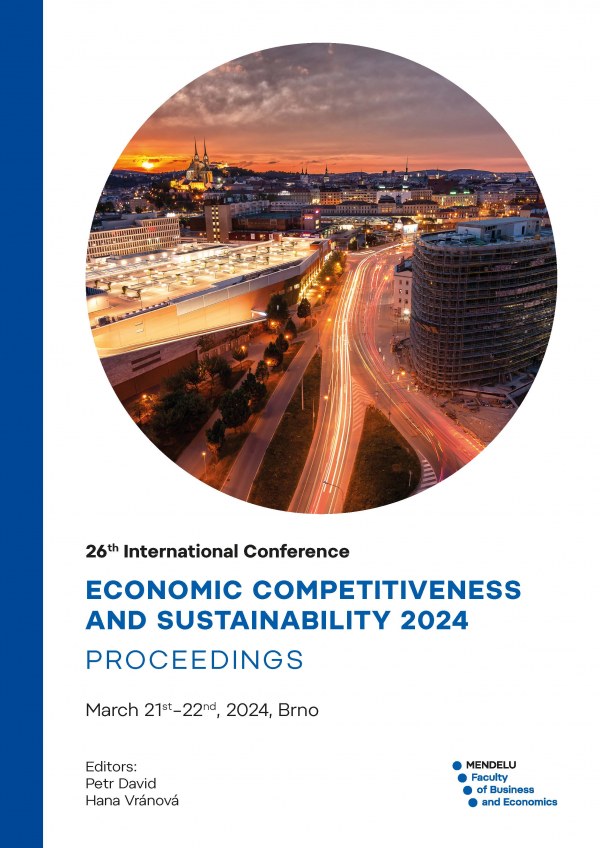
DOI: 10.11118/978-80-7509-990-7-0201
ENHANCING MICRO-CREDENTIALS WITH BLOCKCHAIN
- Martin Záklasník1, Veronika Konečná1, Oldřich Faldík1, Oldřich Trenz1, Andrej Gono1
- 1 Department of Information Technology, Faculty of Business and Economics, Mendel University in Brno, Zemědělská 1, 613 00 Brno, Czech Republic
The article addresses the problem of using micro-credentials in the educational process and explores the possibilities of their deployment through blockchain technology. The topic of micro-credentials as the first step in the process of digitalization of the educational process is presented along with the setting of its trustworthiness. A variety of advantages can be associated with micro-credentials, including the confirmation of individual transactions at the level of the educational process. One of the main problems in the centralized storage of micro-credentials is the risk of unauthorized access and the possibility of leakage of sensitive information. This paper proposes the implementation of blockchain technology as a way to decentralize data storage. This would eliminate the threat of unauthorized access and provide a higher level of data security and integrity. Challenges associated with a centralized certificate authority such as scalability issues and outages are also discussed. It can be evaluated that blockchain can provide a robust and reliable framework for digitizing certificates in the education sector. The conclusions of the paper highlight the benefits of decentralization through blockchain and the need to open up the certification network for corporate certificates. Overall, the paper discusses the importance and benefits of using blockchain technology to enhance the security and efficiency of digital certificates in the education sector.
Keywords: blockchain, digitalization, micro-credentials
pages: 201-210, online: 2024
References
- ALI, W. A., SAHIB, N. M. and WALEED, J. 2019. Preservation Authentication and Authorization on Blockchain. In: 2019 2nd International Conference on Engineering Technology and its Applications (IICETA), pp. 83-88. https://doi.org/10.1109/IICETA.2019.8835346
 Go to original source...
Go to original source... - ALRUBEI, S. M., BALL, E. and RIGELSFORD, J. M. 2021. Securing IoT-Blockchain Applications Through Honesty-Based Distributed Proof of Authority Consensus Algorithm. In: 2021 International Conference on Cyber Situational Awareness, Data Analytics and Assessment (CyberSA), pp. 1-7. https://doi.org/10.1109/CyberSA52016.2021.9435428
 Go to original source...
Go to original source... - AZBEG, K., OUCHETTO, O., JAI ANDALOUSSI, S. and LAILA, F. 2020. An Overview of Blockchain Consensus Algorithms: Comparison, Challenges and Future Directions. In: Advances on Smart and Soft Computing, pp. 357-369. https://doi.org/10.1007/978-981-15-6048-4_31
 Go to original source...
Go to original source... - BLOCKCERTS. 2024. Blockchain Credentials. https://www.blockcerts.org/
- CASEY, J. 2019. My Skills Project [White Paper]. IFI Charitable Trust. https://myskills.org.uk/wp-content/uploads/2019/03/My-Skills-White-Paper-25-3-19.pdf
- CLARK, D. 2016. Ten ways Blockchain could be used in education. oeb-insights [online]. https://oeb.global/oeb-insights/10-ways-blockchain-could-be-used-ineducation/
- CREDLY. 2024. Digital Credentials. https://info.credly.com/
- CREDSURE. 2024. Certif-ID International GmbH. CredSure [online]. https://credsure.io/
- DNV. 2024. Traceable trusted certificates. www.dnv.com [online]. https://www.dnv.com/assurance/certificates-in-the-blockchain/
- EVIDENZ. 2024. The ultimate blockchain digital credentialing technology. https://www.evidenz.io/
- GISH-LIEBERMAN, J. J., TAWFIK, A. and GATEWOOD, J. 2021. Micro-Credentials and Badges in Education: a Historical Overview. TechTrends, 65, 5-7. https://doi.org/10.1007/s11528-020-00567-4
 Go to original source...
Go to original source... - ALSOBHI, Hada A., ALAKHTAR, Rayed A., UBAID, Ayesha, HUSSAIN, Omar K., HUSSAIN, Farookh Khadeer 2023. Blockchain-based micro-credentialing system in higher education institutions: Systematic literature review. Knowledge-Based Systems, 265, ISSN 0950-7051. https://doi.org/10.1016/j.knosys.2022.110238
 Go to original source...
Go to original source... - CHARLES UNIVERSITY. 2024 Zlepšení prostupnosti vzdělání na úrovni vysokých škol pomocí mikrocertifikátů. https://cczv.cuni.cz/CCZV-572.html
- CHARLES UNIVERSITY. 2023. Micro-Credentials at Charles University. https://cczv.cuni.cz/CCZV-572-version1-prirucka___micro_credentials_na_uk_eng.pdf
- JOSHI, S. 2021. Feasibility of Proof of Authority as a Consensus Protocol Model. ArXiv, abs/2109.02480.
- KHALIL, I., AZIZ, O. and ASIF, N. 2021. Blockchain and Its Implementation for Charitable Organizations. In: 2021 International Conference on Innovative Computing (ICIC), pp. 1-10.
 Go to original source...
Go to original source... - MASARYK UNIVERSITY. 2023. Mikrocertifikáty ve vzdělávání. MU je zavádí jako jedna z prvních v Evropě. MUNI [online]. https://www.em.muni.cz/udalosti/16554-mikrocertifikaty-ve-vzdelavani-mu-je-zavadi-jako-jedna-z-prvnich-v-evrope
- SELVARATNAM, Ratna Malar and SANKEY, Michael. 2021. An integrative literature review of the implementation of micro-credentials in higher education: Implications for practice in Australasia. Journal of Teaching and Learning for Graduate Employability, 12, 1-17. https://doi.org/10.21153/jtlge2021vol12no1art942
 Go to original source...
Go to original source... - SERTIFIER. 2024. Sertifier. https://sertifier.com/
- VARSHINEE, C., GEEANESWARI, N. and ROOPESH, S. 2021. The future of continuous learning-Digital badge and microcredential system using blockchain. Global Transitions Proceedings, 2, 355-361.ISSN 2666-285X. https://doi.org/10.1016/j.gltp.2021.08.026
 Go to original source...
Go to original source... - WOLFORD, B. 2023. Everything you need to know about the "Right to be forgotten". GDPR.eu [online]. https://gdpr.eu/right-to-be-forgotten/
- WORLD WIDE WEB CONSORTIUM-W3C. 2022. Verifiable Credentials Data Model v1.1. https://www.w3.org/TR/vc-data-model/
- XIAO, Y., ZHANG, N., LOU, W. and HOU, Y. T. 2020. A Survey of Distributed Consensus Protocols for Blockchain Networks. IEEE Communications Surveys & Tutorials, 22(2), 1432-1465. https://doi.org/10.1109/COMST.2020.2969706
 Go to original source...
Go to original source... - YANG, Z., SALMAN, T., JAIN, R. and PIETRO, R. 2022. Decentralization Using Quantum Blockchain: A Theoretical Analysis. IEEE Transactions on Quantum Engineering, 3, 4100716. https://doi.org/10.1109/TQE.2022.3207111
 Go to original source...
Go to original source... - ZÁKLASNÍK, M., FARANA, R. and SURMA, S. 2023. Digitization of University Diplomas in the European Union. In: SILHAVY, R. and SILHAVY, P. (Eds.). Software Engineering Research in System Science. CSOC 2023. Lecture Notes in Networks and Systems, vol 722. Springer, Cham. https://doi.org/10.1007/978-3-031-35311-6_39
 Go to original source...
Go to original source...


